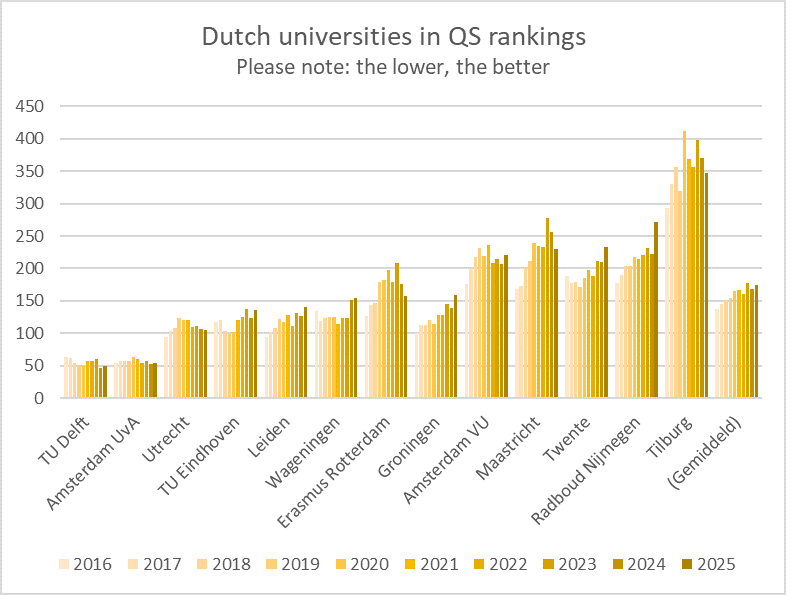UU doesn't participate, comes at number 105
Dutch universities fall in worldwide QS rankings

The latest QS World University Rankings were published last week. The Massachusetts Institute of Technology, in the United States, came first for the thirteenth time. The top ten includes four American and four British universities, the two countries that dominate the ranking. However, positions 7 and 8 are occupied by Switzerland’s ETH Zürich and the National University of Singapore.
The makers of the list have been known for sometimes changing their methods. Last year, for instance, they added sustainability as a criterion, but the universities remained pretty much in the same positions. Major shifts seldom take place.
Reputation
The primary metric remains the reputation of a university among academic researchers and employers. Other topics include the internationalisation of staff and students, citation scores for academic articles and the student-to-teacher ratio.
Over the years, most Dutch universities have been losing ground in the rankings, although there are some exceptions. Utrecht University is once again approaching the top 100. Delft University of Technology and the University of Amsterdam alternate as the best-ranked Dutch university.

Criticism
There are other world rankings in circulation, such as the Shanghai Ranking and the Times Higher Education Rankings. The main criticism faced by these rankings is that they create their own reality: how can one assign a single score to an entire university, with all its staff and students? How significant are the differences, really?
What’s more, some institutions do whatever they can to climb the rankings. A university in Saudi Arabia, for example, has paid academic researchers to say that they worked there so that their reputations would boost that university’s score. Even the points system can be put into question. For example, the Delft University of Technology scored 99 out of 100 points for sustainability, while the University of Twente received 14 points in this area: could the difference really be that big? Citation scores (a measure of the influence of academic articles) are controversial as well. Research on, say, the earthquakes in Groningen will draw little attention outside of the Netherlands. Does that make it less valuable?
That’s why we often hear calls to ignore these rankings. Utrecht University's website states that the university no longer participates in any rankings, which means they don't supply any data for them. However, they are still in this one because it uses external sources, not just the information universities themselves send to them. The university has disappeared from the Times Higher Education ranking, for instance.
At the same time, others warn that these comparisons do tell us something about the position of Dutch universities in the world. The consequences of cutbacks and the curbing of internationalisation are likely to be reflected in the rankings.
Of two minds
On a special webpage on rankings, the association of Dutch universities, Universities of the Netherlands (UNL), summarises the criticism. They argue that the choices made by those who compile the rankings are arbitrary and debatable, so they don’t want to attribute a lot of weight to them.
In an advice issued a year ago, the association said that a culture change was required to prevent universities from using rankings in an “opportunist fashion”. But experts don’t want to ignore the rankings altogether either. “At the same time, this culture change must occur in a way that does not pose disproportionate risks to the reputation and name recognition of universities”, the advice reads.